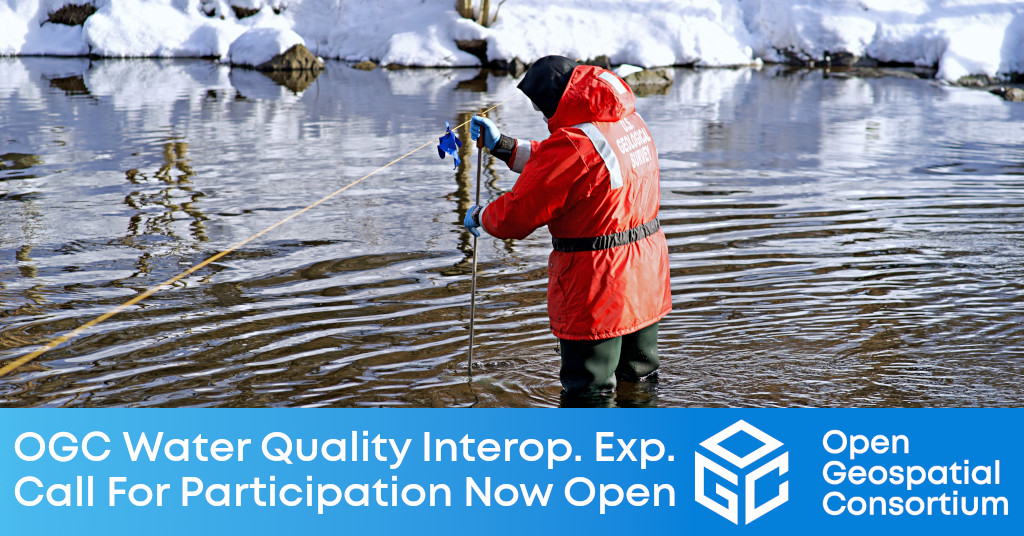Come advance the development of the WaterML 2.0 suite of standards in the area of water quality data, and help increase the effectiveness of related global development activities.

The Open Geospatial Consortium (OGC) has released a Call for Participation (CFP) to solicit proposals for the OGC Water Quality Interoperability Experiment (WQ IE), which will advance the development of the WaterML 2.0 suite of standards in the area of water quality data. Proposal submissions are due by September 13, 2022.
The sharing of water quality data globally and nationally is currently limited. This is likely due to a lack of international standards and practices in this area as well as the variety and distribution of responsibilities across water agencies at national scales. While some practices do exist, most commonly they are on a per country or regional basis . In most cases those practices are not based on current internationally agreed semantic and technical interoperability practices (OGC, W3C, RDA).
The establishment of international standards for water quality data, then, is critical if we wish to enhance the availability of water quality information at the global level and increase the effectiveness of development activities.
Since 2008, Members of the OGC/WMO Hydrology Domain Working Group have been developing the WaterML 2.0 standards for the transmission of a broad suite of water information. Interoperability of water quality data is critical to improved management of water resources and depends on the use of common semantics (vocabularies/taxonomies) and technical scenarios.
The WQ IE will test interoperability and interconnection of existing Water Quality Data Systems. The participants will identify how to support WaterML 2.0 development in the domain of Water Quality (WQ). This includes enhancement of WQ related taxonomies/ontologies and API identification and usage, with the ultimate goal of both the OGC and the World Meteorological Organization (WMO) endorsement of an international standard and/or best practice for Water Quality data exchange.
The WQ IE will be framed by high-level water quality data use cases. For example, data exchange between local jurisdictions and regional or national environmental agencies is a motivating use case. Specific use cases, such as representation of sampled media or measured constituents, are critical to the success of the IE and will be defined as part of the IE.
The WQ IE will deliver an Engineering Report (ER) outlining opportunities to use existing technology, update the WaterML2 Best Practice for water quality, and set the stage for a WMO endorsed data exchange standard for water quality (including shared variables).
The founding organizations behind the Water Quality IE are: Bureau de Recherches Géologiques et Minières (BRGM), France; Centro de Investigación Ecológica y Aplicaciones Forestales (CREAF), Spain; Center for Geospatial Solutions, Lincoln Institute of Land Policy (CGS), USA; Federation University Australia, Australia; Pole INSIDE – Environmental information systems research center, France; United Nations Environmental Programme (UNEP) Global Environment Monitoring System for freshwater (GEMS/Water) Data Centre, Germany; United States Geological Survey (USGS), USA; United States Environmental Protection Agency (USEPA), USA; University of Tartu, Estonia; and World Meteorological Organization (WMO) HydroHub.
This IE will be open to the general public. Participants will be required to make a resource commitment. Technical experts from non-OGC organizations may be Participants in the IE. Other individuals from non-OGC organizations will be allowed in the IE as Observers. Any OGC member may register as an Observer.
For more information on this Interoperability Experiment, including the Call For Participation, visit the OGC Water Quality IE page on ogc.org. Proposal submissions are due by September 13, 2022. The kick-off meeting for theWaterQualityIE is scheduled for September 13, 2022, at 15:00/16:00 CEST.
About OGC
The Open Geospatial Consortium (OGC) is a collective problem-solving community of more than 550 experts representing industry, government, research and academia, collaborating to make geospatial (location) information and services FAIR – Findable, Accessible, Interoperable, and Reusable.
The global OGC Community engages in a mix of activities related to location-based technologies: developing consensus-based open standards and best-practices; collaborating on problem solving in agile innovation initiatives; participating in member meetings, events, and workshops; and more.
OGC's unique standards development process moves at the pace of innovation, with constant input from technology forecasting, practical prototyping, real-world testing, and community engagement.
OGC bridges disparate sectors, domains, and technology trends, and encourages the cross-pollination of ideas between different communities of practice to improve decision-making at all levels. OGC is committed to creating an inclusive and sustainable future.
Visit ogc.org for more info on our work.
“






